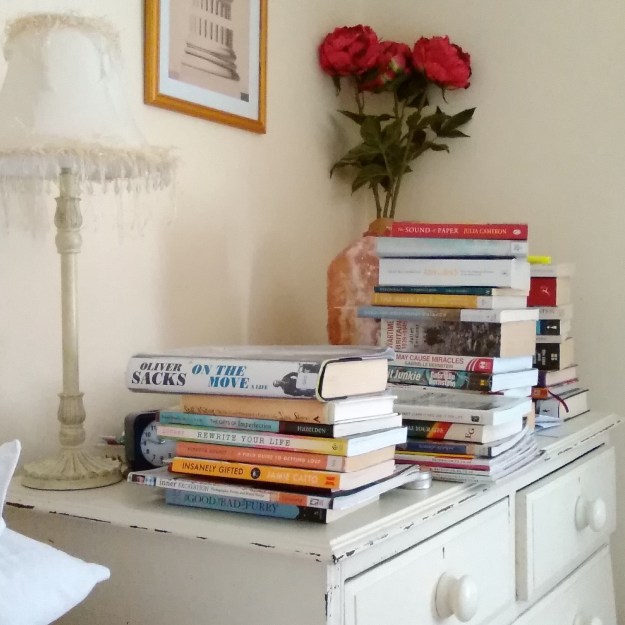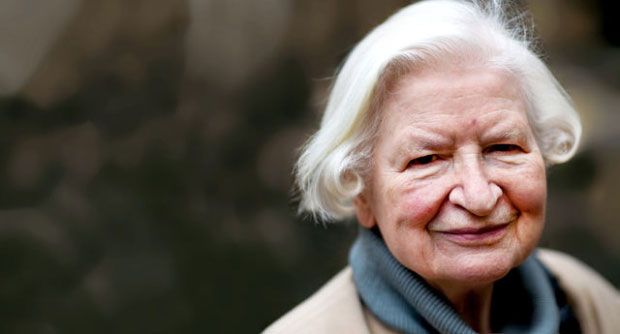
Some books here are waiting to be read.
In my last post about reading, I left you at the point of the story where I had resolved to start reading fiction again, but was at something of a loss as to how to re-establish the habit.
This is the good part. The bit where I tell you what I did, so that you can do it too:
Choose a regular time of day
One of the tips I came across in starting my reading reboot was the idea that in establishing any habit, it helps to have a trigger, a specific time of day, perhaps, which you come to associate with that particular activity. I thought about my mother, who always sat down at 10.30am for a cup of coffee and the Telegraph crossword, and after her lunch at 12noon, she always had half an hour or so special ‘me time’ for reading. It’s a routine she didn’t deviate from for more than 40 years, and in that time she must have read hundreds of books.
Most people read at night. I find that helpful as, like many ME patients, I have a tendency to insomnia, so reading at bedtime helps me to wind down. (NEVER read on your phone, tablet or laptop, however, since the LED display has been proven disrupt the melatonin levels in your brain, making you more awake, rather than less.
You can find the scientific proof, if you are sceptical, here.
Choose a time of day that you can set aside 15-30 minutes of pure reading time, in your lunch hour, on the bus, whenever that most suits your lifestyle, and do it every day.
Block out a chunk of time
I find I really enjoy getting totally immersed in a book, and often, if its one I’m completely absorbed in, I like a big chunk of time to really get to grips. Sunday afternoons are great for this, but I don’t have kids, so this may not work for you. Evenings are great, especially when your partner goes for a night out with their mates. I make an occasion of it, indulgently laying in good chocolate, lighting candles, and maybe even playing soft music in the background.
Grab a moment
I always carry a book with me. I hate to be bored, and any time of the day when I am on my own, perhaps waiting in a queue, on public transport, or grabbing lunch at a coffee shop, is perfect for packing in the next chapter.
Make a list
When I was at college, and, we were given reading lists. A series of texts to wade through. Doing my diploma, I wrote my reading list on a slip of card which I used as a book mark. I drew a line through every book I finished on the list, and went on to the next one. Every time I opened my book, I was presented with tangible evidence of what I had achieved, which spurred me on to read more.
This time around I generated my own list. I happened to have a shelf full of books that I had bought but that remained unread. You know, the ones you get when there is a ‘buy one- get one free’ on summer holiday books in Waterstones, and you read one when you are away, and the rest get forgotten. I made a list of all the unread books I had lying around, and started on them.
Another way you could do it is to visit a bookshop with a notebook and wander round, noting down the books you fancy reading, the ones that attract and intrigue you.
Perhaps you’d like to read on a theme. There are books which will help you with this, like ‘The Novel Cure’.
Many books on writing contain lists of recommended novels that you could work your way through – there is a fantastic one in Francine Prose’s wonderful ‘Reading Like a Writer’. (This is a book you really need to read, by the way.)
Or you could just wander around your local library, pick out a few novels from their displays, or ask a librarian or bookseller for their recommendations. And charity shops are great for plucking out a few juicy reads at affordable prices to add to your stash.
Once you have your list, don’t forget to tick off each book as you finish it. I like to score a line right through each title. It gives me huge satisfaction, and gets me revved up for more.
Stay Faithful – Read to the end
I’m such a butterfly. I have a very short attention span and I’m well-known for getting bored with a book a couple of chapters in, putting it down ‘for the moment’ and never finishing it. I’ll end up with about 17 books on the go, and often have to restart books because I’ve forgotten the story so far.
I have found recently that I do have to resist this temptation. If another title attracts me when I’m half way through my current novel, I now make myself plough on, with the reward of the new one in my sights. My intention is to use my voracious butterfly instinct to flit onwards as a means to spur me on to completion. I won’t let myself open the next title until I’ve finished the first. Sometimes I hate it, but it always feels so great when I get to the end of a book that I don’t care.
Don’t be afraid to dump it
On the other hand … yes, I am about to contradict myself. Sometimes there is a book that you start, and no matter how much you try, you just can’t get on with it. Something, or everything, about it grates.
For years, people had been telling me to read ‘The Corrections’ by Jonathan Franzen. It has been sitting on my shelf, staring at me balefully in reproach. I’ve tried. God knows, I’ve tried. So many times. But I just can’t like this book, and I just can’t read it. So I have given myself permission to let it go. I’m never going to finish it, so what is the point in keeping it. It made its path to the charity shop, along with Ian McEwan’s ‘Atonement’, another book that made me want to spit bullets, and that I have tried to read half a dozen times without success.
Sometimes, it is best to know when you are beaten, and retreat gracefully. Life is too short to waste precious reading time on books you downright hate.
Give up the Telly (At least some of the time)
Where am I going to get all this time, you may be asking? I discovered, when I began to really get back into reading, that I had been watching a whole lot of television. Reruns of old detective shows, documentaries I had seen before, pap that was not feeding my soul or my Muse. It was just filling my time. I discovered it was far more fun to switch off the gogglebox and dive into a book. The pictures were better in my imagination, for starters!
Yes, I know it sounds impossible, but think about it. How long do you spend staring at the TV or getting lost on the internet, looking that things that really are not exciting or entertaining you, but just occupying your eyeballs. Just think how much more fun a good book could be.
Commitment not Discipline
Your reading list is NOT another stick to beat yourself with, another SHOULD to add to your already bulging list. If you don’t get chance to read today, don’t tell yourself you lack discipline. Frankly I think discipline is an evil word, used to oppress, manipulate and shame people everywhere. Its not down to having enough discipline. Its actually down to whether you want to do something enough or not. And if you really want to do it, you will. So what if you didn’t have chance to read today because the baby was running a temperature, or the boiler broke down? Commit to reading tomorrow. Reading is for your pleasure, after all.
Congratulate Yourself
I have a list of ‘Books Read in 2017’ in my bullet journal. When I finish a book, I write it down on my list there, as well as scoring it out on my bookmark. It is a way of congratulating myself. When I get to the end of the year, and look back at my list, I know I will be so proud of how much I’ve achieved, because I’ll have a concrete record of it.
There’s another thing I do. Maybe its not so sensible, but when I finish a book, I like to treat myself. I’ll take myself to the local café for a nice cake. Buy myself a new lipstick or nail varnish. A new notebook or a nice pen. Nothing too big. Just a little treat to say ‘well done.’ Because, let’s face it, you put a lot of hours and concentration into finishing a 300-page novel. You deserve a pat on the back!
Of course, volume is not everything. At the moment I am re-establishing the habit of reading, and the issue of what I read, and how it impacts on my writing is something for the future. I may go back to keeping a reading notebook, as I have in previous years. No doubt there will be future posts on the subject. But in the meantime, I hope that something here will help you to get back into the habit of reading, if you have dropped out of it, and if not, that you can discover something new to enhance your enjoyment.
Happy Reading – and Creating,
Love EF







